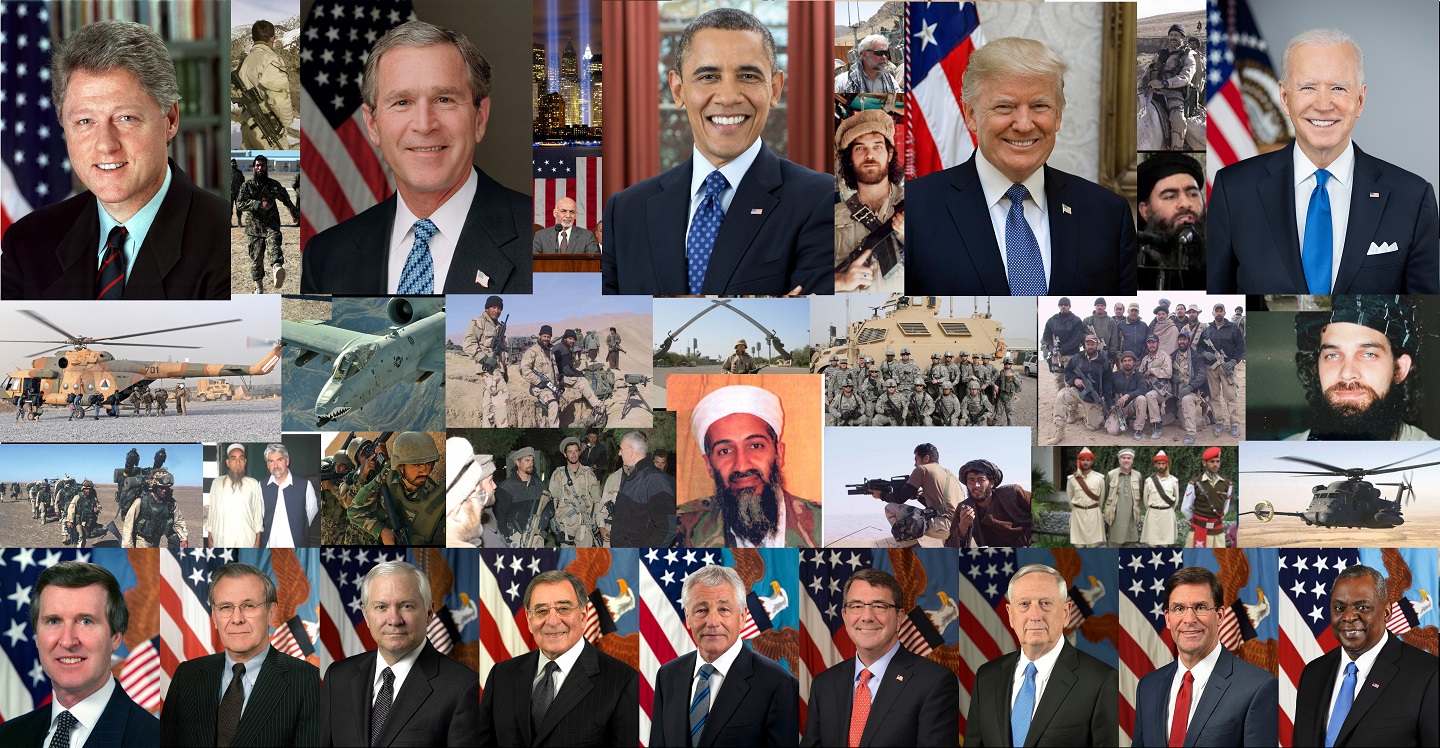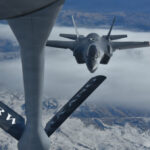
America’s youngest soldiers today were not even born when this war began but their generation will suffer its consequences most.
In 2001, the United States invaded and occupied Afghanistan, and eventually spent over a trillion dollars, as it and its allies killed some 170,000 Afghan citizens. Twenty years later, the United States withdrew from Afghanistan in defeat.
Why was America there? Thucydides reminded us in The Peloponnesian War some 2,500 years ago that, war’s “three…strongest motives [are] fear, honor, and interest.” The United States went to war in Afghanistan in the wake of the 9/11 attacks due to fear and to protect its honor, but inadequate understanding of Afghanistan and its geopolitical neighborhood as well as limited U.S. interests prompted mission creep, such that 20 years marched on. America’s youngest soldiers today were not even born when this war began, but their generation will suffer its consequences most. The U.S. withdrawal from Afghanistan will destroy American honor and undermine American interests. Further, the suicide bombing reportedly carried out by the terrorist group ISIS-Khorasan on August 26, 2021, suggests that even fear, the initial motive for intervention, still exists. Perhaps the United States and other major powers can win only when they are motivated by intense fear. And once Osama bin Laden scurried away to Pakistan, the fear receded—or more probably, humans simply cannot stay in a state of intense fear for very long.
The United States could not even exit before the Taliban (the very group the United States and its allies went there to fight) took over the country again. The question now is — as it was with Vietnam and Iraq and Syria — why couldn’t the world’s so-called greatest power win in Afghanistan? Consider the following 10 reasons.
First, Afghanistan, the arena for the Russo-British “Great Game” of the 19th century, became a 20th century cauldron of competition between the United States and Soviet Union. The 1978 takeover of the Afghan government by Marxists prompted a response by Afghan Islamists. The resulting civil war led the USSR to invade Afghanistan in late 1979, turning the country into an ideological battleground during the 1980s. The United States supported the Islamists, but some of them became adversaries after the Soviet withdrawal from Afghanistan in 1989 and due to America’s Middle Eastern wars of the 1990s and thereafter.
Second, while the Islamist Taliban swept away the Afghan Communists in 1996, the ancient, often reinforcing ethnolinguistic, tribal, and religious cleavage lines that divide Afghan society grew more significant. Pashtuns from Afghanistan’s south and east, who overlapped into Pakistan; the largely Shia’ Hazara and Dari/Farsi speakers from western Afghanistan, who turned toward Iran; and Tajik, Uzbek, and Turkmen Afghans from the north, who sought succor from the post-Soviet neighboring countries—they were all just the tip of the iceberg in a complex identity mélange, which constantly roils Afghanistan.
Third, after al-Qa’ida attacked the World Trade Center and Pentagon, the United States turned immediately to Afghanistan to kill or capture Osama bin Laden and his chief lieutenants, but they fled to Pakistan. Bin Laden was eventually found and killed by U.S. Special Forces in Abbottabad, Pakistan in 2011. Taliban, Al-Qa’ida, and other Islamist leaders were also killed in Pakistan—often by drone strike—between 2004 and 2018. Yet, the United States stayed on the ground in Afghanistan for 20 years. Why, when the United States could have used remote technology and airpower to kill opponents from afar? The ground mission began as a way to prevent Afghanistan from being a terrorist breeding ground. Thus, the United States slid into regime-change, development, and nation-building in one of the poorest countries in the world in 2001. It had no functioning government, and its economy centered on narcotics production.
Fourth, the United States had no idea how to address any of these problems. Indeed, President George W. Bush had campaigned against nation-building just the year before. The Bonn Accords of November 2001, Emergency Loya Jirga of June-July 2002, and the Constitutional Loya Jirga of December 2003-January 2004 were supposed to create a government that could replace the Communist regime of the 1980s and the Taliban of the 1990s. Instead, they eliminated political legitimacy for the new Afghan government. The new “democratic” system in a deeply fragmented country encouraged tremendously fraudulent elections, most significantly Ashraf Ghani’s “victories” in 2019 and 2014, and Hamid Karzai’s in 2009. The United States turned instead to the United Nations to run elections, to the international community for money (often promised but not paid) and military forces (which were scattered to different provinces and controlled by the home country, rather than the commanding general). With many commanders, no one was in charge.
Fifth, the United States had no overarching strategy, instead dividing its military strategy into counterterrorism (CT), largely the province of the Central Intelligence Agency’s Special Activities Division and the Defense Department’s Special Operations Command, and counterinsurgency (COIN), which fell to the rest of the Department of Defense. Under the CT campaign, the United States invaded compounds all over the country, upsetting family honor, and arresting and transporting hundreds of Afghans to Guantanamo Bay and other foreign detention centers, keeping many of them imprisoned for years, with no charges or the possibility of release. The COIN effort lacked enough soldiers and was constantly changing ideas about how to defeat the Afghan insurgents. It tried Provincial Reconstruction Teams, a “Clear-Hold-Build” strategy, and fighting from forward operating bases (FOBs), before taking an “Advise-Train-Assist” approach (which ultimately transformed into a mission to build the Afghan Defense and Security Forces). Poor strategy was compounded with poor tactics and poor planning. Too few soldiers were sent to control a large, rural country, even though defeating a group like the Taliban demands a near-continuous presence in rural areas which were ultimately the military “center of gravity” of this conflict. The support, or at least help, of the rural population was critical, but the military generally struggled with local languages and culture, which meant that the Taliban could completely dominate. While the United States struggled to find its footing tactically and strategically, the Taliban had a coherent strategy to hang around and wait for the United States to leave, and it was also able to execute successfully its immediate tactical goal to encourage the United States into terrible miscues, overreach, and insensitivity to local conditions.
When Ashraf Ghani and other government leaders fled ahead of the Taliban with millions of dollars in cash, no one was surprised.
Sixth, even though the United States and its allies deployed too few soldiers to do the job, they still poured tons of money into Afghanistan. This influx of money seemed like a good idea at first, as Afghanistan needed everything rebuilt after decades of high-intensity war, and had only an agricultural economy, built on illegal opium. However, Afghanistan has a system where certain elders (khans) use their money in a patronage fashion toward their local supporters. Between that arrangement, the longtime war economy, and Afghanistan’s limited absorptive capacity, everyone wanted to pad their pockets against the threat of future upheaval. Before long, vast corruption of all sorts became the norm. When Ashraf Ghani and other government leaders fled ahead of the Taliban with millions of dollars in cash, no one was surprised. Indeed, it was widely known that many government officials had used ill-gotten gains to purchase villas in Dubai, Doha, and other safer locations long before the country fell.
Seventh, the Taliban fled to and received succor in Pakistan. The Taliban, being predominantly Pashtun, slipped across the border into both Pashtunabad, just outside of Quetta, Baluchistan, and into the Federally Administered Tribal Agencies between Khyber-Pakhtunkwa and the Afghan border. These heavily Pashtun areas were the old digs of the Mujahideen from the 1980s, and once again allowed the Taliban to become pawns of Pakistan’s Inter-Services Intelligence Directorate (ISI). It is nearly impossible to find a defeated insurgency that had such an easy refuge in a contiguous state. Pakistan controlled the major access route into Afghanistan, as well as sheltering the Taliban, thereby making Pakistan into a complicated “frenemy” of the United States.
Eighth, when the United States invaded Iraq in March 2003, Afghanistan became the “forgotten war.” In 2003, over 300,000 American troops invaded Iraq, while less than 10% of that number of Americans were in Afghanistan. For the rest of the 2000s, Iraq dominated Afghanistan in the consciousness of most Americans. In 2010, President Barack Obama felt compelled to surge additional troops into Afghanistan to try to regain control over the Taliban. Iraq overshadowed Afghanistan for much of the last 20 years, often occluding the American march toward doom.
Ninth, American officials throughout the war exaggerated and prevaricated so routinely that it became difficult for average Americans (and even national security experts) to understand the situation there. Eventually, an office of the Special Inspector General for Afghanistan Reconstruction (SIGAR) was created to report on government efforts in Afghanistan, but few read the detailed SIGAR reports and instead believed the positive pronouncements of our policy makers, generals, and ambassadors who talked of “success,” “progress,” and “the light at the end of the tunnel.”
Finally, and perhaps most importantly, the United States lost its willingness to lead. The country went to Afghanistan to avenge 9/11, but its leaders immediately began planning a war against Iraq that had nothing to do with 9/11. The United States asked NATO for help in Afghanistan but refused to run it as a war that had to be won with American leadership. The United States put up with Pakistan supporting the Taliban. By the 2010s, American presidents began talking about “leadership from behind” (President Barack Obama), “making America great again” (President Donald Trump), and “building back better” (President Joseph Biden), all slogans about America rather than about leadership. At almost every turn, the United States failed to lead, and the United States can no longer be a great power if its people do not choose to carry the burdens of leadership that great powers must carry. The United States today is racked with extremism and racial challenges, political disagreement over whether its citizens should be vaccinated or masked against an infectious disease, challenges to its democracy, and unwillingness of its major political parties to cooperate to do anything. And it has now lost every significant war since World War II.
We deeply regret what is coming for Afghanistan, which is most likely a new civil war, waged between Afghan proxies on behalf of regional powers. We also regret what is coming for the world, which will only be able to see the U.S. defeat as the profound failure of a declining power. The American adventure in Afghanistan was a disaster from the beginning to the end. Many good, inspired, brave, and even noble people from all over America and all around the world tried very hard to make Afghanistan a success, as others fought and schemed to thwart that. They won, and the United States – we – failed.
EDITOR’S NOTE: The article has been updated to correct an unfortunate misspelling of President Obama’s first name. Stupid spell check.
Larry P. Goodson is Professor of Middle East Studies at the U.S. Army War College and author of the best-selling Afghanistan’s Endless War (2001).
Thomas H. Johnson is Research Professor at the Naval Postgraduate School and author of multiple books on Afghanistan including Taliban Narratives: The Uses and Power of Stories in the Afghanistan Conflict (2018).
The views expressed in this article are those of the authors and do not necessarily reflect those of the U.S. Army War College, the U.S. Army, or the Department of Defense.
Photo Credit: All photos are provided by the authors or are public domain courtesy of the U.S. White House and Department of Defense





Given such things as Sep 11, 2001 — and such things as Jan 6, 2021 — it is clear that we must:
a. Come consider such things as “honor, interest and fear;” this:
b. More from the perspective of our “opponents”/our “enemies.”
(In both the 9/11 and 1/6 examples suggested above, “our opponents”/”our enemies” are best understood as those individuals and groups — for example, in both the Greater Middle East and in the U.S./the West today — whose more-traditional and preferred ways of life, more-traditional and preferred ways of governance, more-traditional and preferred values, jobs, etc., have been — and continue to be — threatened; this, by such things as the political, economic, social and/or value changes [a] demanded such things as capitalism, globalization and the global economy and [b] the governments working for and supporting same.)
It is from THIS such perspective, I suggest — to wit: that we failed to give proper consideration to the “honor, interest and fear” concerns of much of the world’s populations — that we:
a. Were caught “flat-footed” on both 9/11 and 1/6.
b. Were caught “flat-footed” with respect to both the Brexit and the election of Donald Trump. And:
c. Failed to understand what it would actually take; this, to “win” these “wars of modernization/ “wars of further modernization” — both in the Greater Middle East — but also here at home in the U.S./the West today.
In my initial comment above, I suggested (rather indirectly?) that what went wrong in Afghanistan (and in the U.S./the West also), this was a failure of the U.S./the West to adequately appreciate (a) the “honor, interest and fear” response that (b) would forthcoming from those individuals and groups, (c) whose traditional and preferred ways of life, etc., (d) were threatened by the U.S./the West’s — now more market-oriented — political, economic, social and/or value “change” initiatives.
Question:
Given my such thesis above — should we not now consider adding in Russia and China also — to this “what went wrong and why” list?
My thinking here being that — much as with the Greater Middle East and the U.S./the West above — likewise with contemporary Russia and China also — “what went wrong,” this can be traced to the U.S./the West (a) failing to adequately consider the “honor, interest and fear” response (in these cases, manifested in conservative/”old school” sovereignty and spheres of influence thinking?) that (b) would forthcoming from Russia and China (both of whom consider themselves threatened by the U.S./the West’s political, economic, social and/or value “change” initiatives.)
Thus, an across-the-board/an across-the-world failure; this, due to the “failure to adequately appreciate honor, interest and fear” reasons I suggest above?
Interesting you put 9/11 and 1/6 in similar categories. I believe 9/11 was a terrorist attack against America in response to US activities abroad. I believe 1/6 was a response to perceived election fraud executed by the deep state and aided by mainstream media and big-tech censorship of social media. The perpetrators of 9/11 were intent on bringing down the “American way”, where the perpetrators of 1/6 may have been intent on protecting the “American way” against the mass censorship and fraud executed by a perceived domestic enemy.
Outstanding post. I agree with your comments.
Can you elaborate on what you mean by the following statement: “Were caught “flat-footed” with respect to both the Brexit and the election of Donald Trump”.
Specifically who was caught flat footed by lawful elections that occurred in Great Britain and later in the United States?
Further, can you provide some deeper explanation as to what connectivity the election of Donald Trump or Brexit has in “what went wrong in Afghanistan”?
If you believe it is the Department of Defense that was caught flat footed and could not execute a successful withdrawal plan after four years of the Trump Presidency and after twenty years in the Afghanistan theater of operations, then I suggest we (the Department of Defense) have some deeper issues which need examination.
Henry Jekyll and Georgious Agesious:
In an attempt to answer some of your questions above, consider this item from Dr. Walter Russell Mead. Therein, note how he also seems to see 9/11 and the Trump/Brexit phenomenon (which, in the U.S., will ultimately lead to 1/6) as (a) an unanticipated (“honor, interest and fear?”) response to (b) the political, economic, social and/or value “change” demands of what he calls “market society.” (The more-conservative/the more-traditional “communities” — in both the Greater Middle East and in the U.S./the West also — deciding to, once again as they have in the past, actively, physically and forcefully resist these such “change” demands.)
“Over the past quarter century, Western policymakers became infatuated with some dangerously oversimplified ideas. They believed capitalism had been tamed and would no longer generate economic, social, or political upheavals. They felt that illiberal ideologies and political emotions had been left in the historical dustbin and were believed only by ‘bitter’ losers’–people who ‘cling to guns or religion or antipathy toward people who aren’t like them… as a way to explain their frustrations,’ as Barack Obama famously put it in 2008. Time and the normal processes of history would solve the problem; constructing a liberal world order was simply a matter of working out the details.
Given such views, many recent developments–from the 9/11 attacks and the war on terrorism to the financial crisis to the recent surge of angry nationalist populism on both sides of the Atlantic–came as a rude surprise. It is increasingly clear that globalization and automation have helped break up the socioeconomic model that under-girded postwar prosperity and domestic social peace, and that the next stage of capitalist development will challenge the very foundations of both the global liberal order and many of its national pillars.
In this new world disorder, the power of identity politics can no longer be denied. Western elites believed that in the twenty-first century, cosmopolitanism and globalism would triumph over atavism and tribal loyalties. They failed to understand the deep roots of identity politics in the human psyche and the necessity for those roots to find political expression in both foreign and domestic policy arenas. And they failed to understand that the very forces of economic and social development that cosmopolitanism and globalization fostered would generate turbulence and eventually resistance, as ‘Gemeinschaft’ (community) fought back against the onrushing ‘Gesellschaft’ (market society), in the classic terms sociologists favored a century ago.”
(See the Mar-Apr 2017 edition of “Foreign Affairs” and, therein, the article by Walter Russell Mead entitled “The Jacksonian Revolt: American Populism and the Liberal Order.”)
Here’s a thought- Perhaps we as a nation have forgotten how to deal with tribes. Our DoS tends to change governments into democracies to deal with them instead of working with they have for the moment. In the Fourth stage of Warfare, Stability, the DoS is the lead agency and not the DoD. The DoD knows how to deal with adversaries when not constrained, constantly changing the mission (mission creep), or the rules of engagement (ROE).
You opine, “The United States stayed on the ground in Afghanistan for 20 years. Why, when the United States could have used remote technology and airpower to kill opponents from afar?”
In fact, the United States is far more likely to kill innocent aid workers and children from afar. Boots on the ground includes eyes, ears, and street smarts; all of which are lost “from afar”.
What “went wrong” was a failure to clearly articulate our military mission in Afghanistan which was the primary mission. We then adapted a secondary mission of nation-building which was never going to work in this cultural setting. Then we lost focus on our primary mission, and ended up pulling both missions out in frustration over the failure of the secondary mission….
What went wrong in Afghanistan (and the rest of the sand box as well) was the Rules of Engagement, which were more restrictive for the troops in a war zone than they are for police in the US!!!
In football, the referees can throw a penalty flag. In 2002 – 2003, our generals should have thrown a BS flag.
War and the Art of Governance: Consolidating Combat Success into Political Victory by Nadia Schadlow
https://www.armyupress.army.mil/Journals/Military-Review/MR-Book-Reviews/july-2017/Book-Review-001/
Director Nanda,
Instead of focusing on the Taliban rule, you should focus on how we change the Department of State which has a number of officials who trained under you. You should focus on how the European Union could become a “Global Strategic victim!”
As we have seen in the Afghanistan Withdrawal Debacle, Secretary of State Tony Blinken has, so far, failed to try to fix systemic problems of long standing within the Department of State. Nor does it appear that he is trying to apply lessons learned from prior decades or centuries of already well known Department of State dysfunctions. Those dysfunctions are: “Tour Lengths: Undermining Effectiveness,” “Confusing Policy with Implementation,” “Intellectual Arrogance” and “A Mechanism for Surging Staff.” With the chaos and confusion in evacuating American citizens and our Afghan allies, it is visible for all to see that the Department of State failed to surge staff needed to process all those fleeing in a timely fashion.
Aside from the Department of State and its dysfunction, none of the other federal civilian agencies have an expeditionary capability. Some of the federal bureaucrats want to call in advice from the safety of Washington, DC without having any long standing knowledge of local conditions or local cultures.
Appalled at the debacle, the European Union realizes that America could abandon them as well, making them a “Global Strategic victim!” The UK and some European nations considered picking up America’s mantle in Afghanistan, but when they looked at it, they realized:
“even if they could find the infantry, they simply couldn’t field the intelligence, surveillance, and reconnaissance; the command and control; the logistics; and the training that supported the Afghan army. They couldn’t even get themselves to Afghanistan and sustain themselves, let alone sustain an Afghan army of 300,000.”
The Department of State said that American citizens shouldn’t come to the airport but leave Afghanistan immediately. American citizens stranded in Afghanistan translated that as, “You are on you own. We will not help you!” Likewise, the European Union understood America will act in its own national interest and translated that as, “You are on you own. We will not help you!”
Help me out here, did Joe Biden set back our Transatlantic ties with NATO?
Intervention: Unlearned Lessons, or the Gripes of a Professional: The State Department’s failure to effectively staff and run interventions requiring close civil-military cooperation in the field has a long history. Four critical lessons can be drawn from the post-9/11 experience. BY RONALD E. NEUMANN
https://afsa.org/intervention-unlearned-lessons-or-gripes-professional
‘Europe Runs the Risk of Becoming a Global Strategic Victim;’ Retired British Gen. Richard Barrons warns that the United Kingdom and European Union can no longer simply rely on the United States for their security.
https://foreignpolicy.com/2021/08/23/europe-runs-the-risk-of-becoming-a-global-strategic-victim/
To Regain Policy Competence: The Software of American Public Problem-Solving
https://tnsr.org/2019/09/to-regain-policy-competence-the-software-of-american-public-problem-solving/
Bitter Lessons from Afghanistan
https://quillette.com/2021/09/22/the-lesser-action/